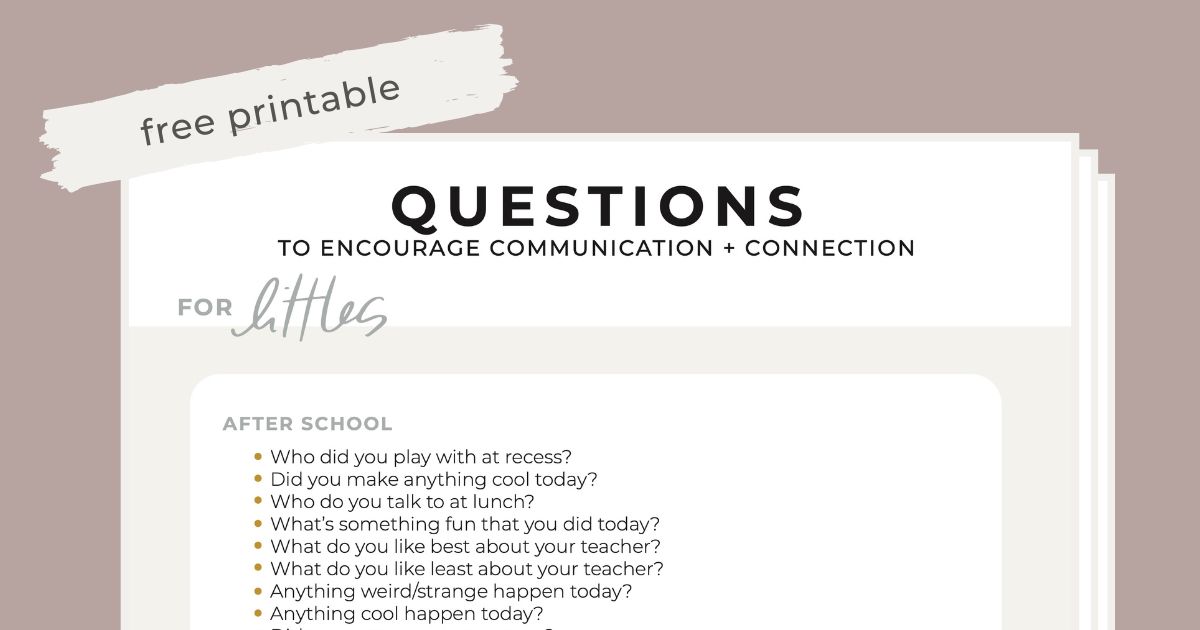Did you know you can meaningfully connect with your child in just 9 minutes a day? Use these questions to open communication after school.

Do you want to know how to make your child feel special in 9 minutes?
What the research says is that if we communicate with our children during the 9 most important minutes of their day, they are much more likely to feel centered and loved.
When are those 9 minutes? During the crossroads:
- 3 minutes after they wake up
- 3 minutes when they come home from school
- 3 minutes at bedtime
Even the busiest parents can carve out a minimum of 9 minutes a day for each of their children. You do not need to schedule out huge blocks of time for your children, but practice being completely present and open with them in the time you do have.
I’m going to give you a head start for connecting after school, and it begins with asking better questions.
After School Questions
“What did you learn today?”
“Nothing!”
Is this a common interaction in anyone else’s home?
The first step to improving our after-school interactions with our children is to ask better questions. Questions that encourage communication and connection and need more than a one-word answer or a shrug.
I’ve created a printable resource, a list of questions you can ask your child that are a step above “How was your day?” and will encourage quality conversation.
Sign up below and your list of printable questions will be sent straight to your inbox.
Connecting with Young Kids
Young children may have small bodies but they can have BIG feelings, especially after a long day at school. They have been dealing with disappointments, friend squabbles, and hunger all day- and they need a safe place to land.
Ideas for communicating with young kids:
- Younger kids need validation just as much as we do. When they’re stuck and frustrated they can’t have what they want, try giving them their desires through imagination even if you can’t in real life. I.e., “What if we had so many goldfish crackers that we filled the inside of the car up to the top? What would happen if you rolled the windows down?”
- If your younger kid can’t seem to express him/herself with words, give them paper and pencil and ask them to draw what they mean!
- When you feel like you’re getting nowhere fast, try a change of scenery. Go outside, move to the couch for a cuddle, or play a game.
Questions to ask:
- What would help you feel calm and safe?
- Did you make anything cool today?
- Who do you talk to at lunch?
- Can you draw your feelings for me?
- Who did you play with at recess? What did you play?
Connecting with Older Kids
Some parents are intimidated by their teens- don’t be! Even if they act like they don’t need you or your opinion, your love and acceptance of them is an anchor in their changing world.
Ideas for talking with teens:
- Remember to touch your older kids too! Never underestimate the power of a good back scratch in helping teens open up.
- Use safe talk! Learn how to “shoot the breeze” with your older kid. This means avoiding judging, advising, preaching or overreacting. Instead, stay curious, ask questions, and be playful.
Questions to ask:
- Did anything strange/cool happen today?
- Are any big events happening this week?
- What was the hardest/most boring/most fun thing you did today?
- Would you like my advice or would you rather I just listen?
- How is all this making you feel?
I want to challenge you to practice communicating with your kids by connecting with them every day after school this week for 3 minutes. Just 3 minutes!
I know you are up to the challenge and it will make all the difference to your child.
If you want to learn more about connecting with your child, you will like these other free resources:


Any tips on how to do this with multiple children who arrive home at the same time? My kids are all eager to talk at once and it’s a struggle for them to stay excited about talking with me about their day when they have to wait for one or two other siblings to go first
This is a great question and I’m sure a concern for many! Here are a few ideas:
-try staggering their afternoon routine so when one child is washing their hands and putting their shoes away, you could chat with the other child and then switch
-have the child waiting to talk to you draw a picture or write about what they want to say so they don’t forget
– say “I’m so excited to hear about your day. Can you give me one minute with your brother and then I want to hear all about it?”